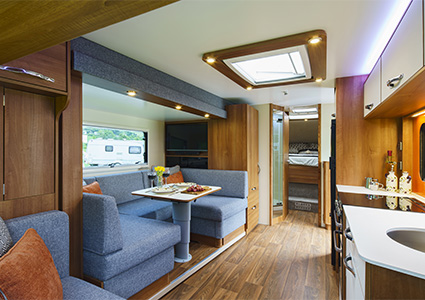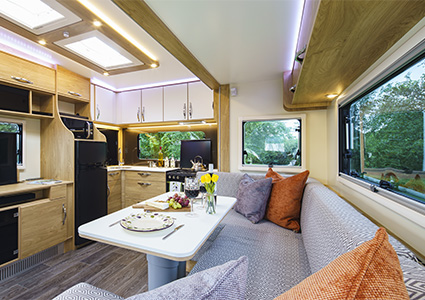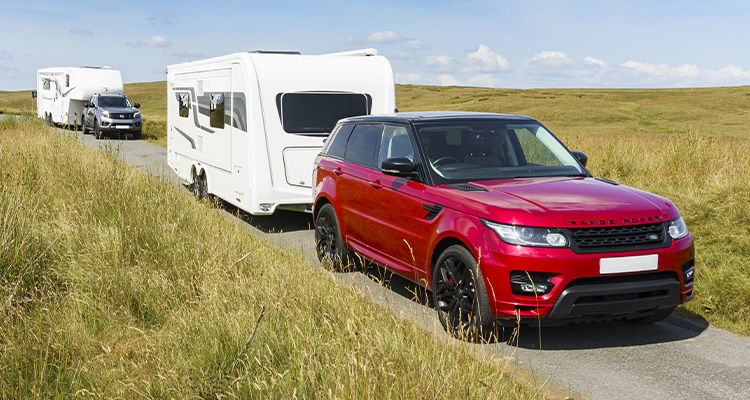How US inspired designs are transforming European caravan markets
Fifth Wheel Company emerged from recognizing the potential for a European market for caravan designs that had become popular in the US. After initially importing some models, it became clear that a better way to go would be to manufacture the tourers in the UK according to European standards and legislation. In 2002 the first European compliant fifth wheel caravan was produced. From there the business grew organically, incorporating new models including a traditional hitch caravan. As the company expanded, a caravan park was opened next door to better facilitate handover from sales and training. This grew to incorporate a restaurant and spa enabling customers coming to complete a purchase or service their vehicles to experience the highest level of service.
 Gethin Whiteley, Technical Director of Fifth Wheel Company explains the evolution of the manufacturing processes. “When we began there were two of us designing all the products. We sent the drawings to specialist manufacturers across Europe who produced the components. Over the twenty years we’ve been manufacturing we have gradually brought more processes in-house. Today, we produce about 80 percent of our caravans, with just the fiberglass, upholstery and chassis sourced externally. The chassis comes in from a factory just fifteen minutes down the road.”
Gethin Whiteley, Technical Director of Fifth Wheel Company explains the evolution of the manufacturing processes. “When we began there were two of us designing all the products. We sent the drawings to specialist manufacturers across Europe who produced the components. Over the twenty years we’ve been manufacturing we have gradually brought more processes in-house. Today, we produce about 80 percent of our caravans, with just the fiberglass, upholstery and chassis sourced externally. The chassis comes in from a factory just fifteen minutes down the road.”
Streamlining the manufacturing operation over the years by internalizing more processes and localizing supplier networks where possible has enabled Fifth Wheel Company to create a bespoke product that can easily be adapted to a customer’s needs. Gethin expands on what sets the caravans apart from the competition: “The main advantage of a fifth wheel is having the convenience and practicality of a caravan and car while having the space and luxury of a high-end motorhome. You’ve got a base you can explore from and with the sides that pull out you have a space that feels more like an apartment in stark contrast to how confined traditional caravans can feel.”
Gethin goes on to outline the benefits of having the caravan park and adjoining facilities on-site. “A lot of our customers are first time owners; we provide training for them which is a three-day course. They can stay in their new caravan while learning the fundamentals. The first day is a full day of training, and then on the second day, the customers practice the skills they’ve learnt, and finally the third day is about perfecting anything that needs a bit of improvement. Having this process on site means that any tweaks or minor changes are significantly easier to facilitate. Just like when you move into a new house there’s always a small list of things that you want to adapt. Having the spa to relax after a day of training, and the restaurant on site adds another level to the experience.”
Gethin then goes on to highlight how key equipment and technologies aid the customization process. “Buying new machines and obtaining a vacuum press has enabled the company to make tweaks to the product in ways that just aren’t possible when using an expensive one-off piece from an external supplier. Bringing these processes in-house has also enabled us to be innovative with the manufacturing processes. Our panels for example are a system we developed ourselves. They use no wood, and are filled with a core insulation made from recycled bottles.”
enabled the company to make tweaks to the product in ways that just aren’t possible when using an expensive one-off piece from an external supplier. Bringing these processes in-house has also enabled us to be innovative with the manufacturing processes. Our panels for example are a system we developed ourselves. They use no wood, and are filled with a core insulation made from recycled bottles.”
This leads Gethin on to the company’s broader commitment to sustainability: “As well as recycling all of our waste, we use recycled or sustainable materials wherever possible. Along with the insulation made from recycled bottles we also use lamb’s wool, and we utilize natural products like leather in the upholstery. As we have increased what we manufacture ourselves we have become significantly more aware of the wastage that can occur, now we can see the raw materials required to make a certain component so we’re very conscious of limiting what goes to landfill.”
When producing a premium product maintaining quality and consistency across a supply chain is essential. Gethin outlines how the business manages this. “Experiencing some of the challenges that Covid presented led to our network evolving as we built in more resilience. We now have back up suppliers for all of our parts, even the ones we produce ourselves, for example. We also utilize as many local suppliers as possible, with the majority of the bespoke parts we need coming from within an hour and a half away.”
Having a streamlined manufacturing process with a secure supply network enables Fifth Wheel Company to focus on its export business. “The biggest market for us is Europe,” Gethin explains. “Our dealer in Germany took half of our stock last year, worth over £2.5 million. This year we’re looking at 50 percent in the UK and 50 percent elsewhere with some units going as far afield as Australia and New Zealand.”
With new products on the horizon, including a motorhome and new editions of the current line, as well as a planned expansion of the factory and continued growth across the dealership network, the business is poised to capitalize on its ambitions to expand its global exports.
